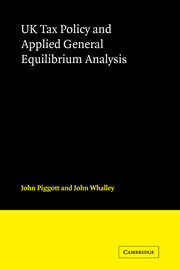Book contents
- Frontmatter
- Contents
- PREFACE
- ACKNOWLEDGEMENTS
- INTRODUCTION AND SUMMARY OF STUDY
- PART I The General Equilibrium Model of the UK – Structure, Data and Model Solution.
- PART II Empirical Analysis of the UK Tax/Subsidy System Using the General Equilibrium Model
- CHAPTER 7 Detailed Analysis of Central Case Model Experiment Involving Removal of Non-Savings/Non-Leisure Tax/Subsidy Distortion
- CHAPTER 8 Analysis of Structural Characteristics of the Tax/Subsidy System
- CHAPTER 9 Further Analysis of Tax/Subsidy Distortions
- SUMMARY AND CONCLUSIONS
- APPENDIX A Structure of the Basic Variant Model
- APPENDIX B Notes to Tables Appearing in Chapter 5
- APPENDIX C Notes on Programming and Computation
- BIBLIOGRAPHY
CHAPTER 9 - Further Analysis of Tax/Subsidy Distortions
Published online by Cambridge University Press: 04 August 2010
- Frontmatter
- Contents
- PREFACE
- ACKNOWLEDGEMENTS
- INTRODUCTION AND SUMMARY OF STUDY
- PART I The General Equilibrium Model of the UK – Structure, Data and Model Solution.
- PART II Empirical Analysis of the UK Tax/Subsidy System Using the General Equilibrium Model
- CHAPTER 7 Detailed Analysis of Central Case Model Experiment Involving Removal of Non-Savings/Non-Leisure Tax/Subsidy Distortion
- CHAPTER 8 Analysis of Structural Characteristics of the Tax/Subsidy System
- CHAPTER 9 Further Analysis of Tax/Subsidy Distortions
- SUMMARY AND CONCLUSIONS
- APPENDIX A Structure of the Basic Variant Model
- APPENDIX B Notes to Tables Appearing in Chapter 5
- APPENDIX C Notes on Programming and Computation
- BIBLIOGRAPHY
Summary
Introduction
In this chapter we consider additional features of public sector activity in the UK by extending our basic variant model in a number of directions. We analyze both the tax distortion of the labour-leisure choice and the distortion of savings. We also evaluate the distorting effects of the tax system through its interaction with inflation. We next consider the income effects associated with the transfer mechanism on the expenditure side of government activity and briefly discuss some stylized calculations associated with welfare reform. We also examine an alternative solution concept for our model in which the level of provision of public services is endogenously determined as part of the optimizing procedure. Finally a particular tax reform experiment associated with the changes introduced in the UK is reported, in order to demonstrate the applicability of our approach to more practical situations where explicit tax reform proposals are being considered.
Tax Distortions and Labour Supply
Our central case analysis in Chapter 7 assumes the supply of factors is fixed as changes occur in taxes and subsidies. In this section we use a factor supply model in which labour supply depends on taxes.
We consider households to have utility functions which are defined not only over the commodities in the model, but also over consumption of leisure. We augment the labour endowment of households so that households repurchase a portion of their labour endowment in the form of leisure, with their purchase decision following directly from utility maximization.
- Type
- Chapter
- Information
- UK Tax Policy and Applied General Equilibrium Analysis , pp. 268 - 304Publisher: Cambridge University PressPrint publication year: 1985



